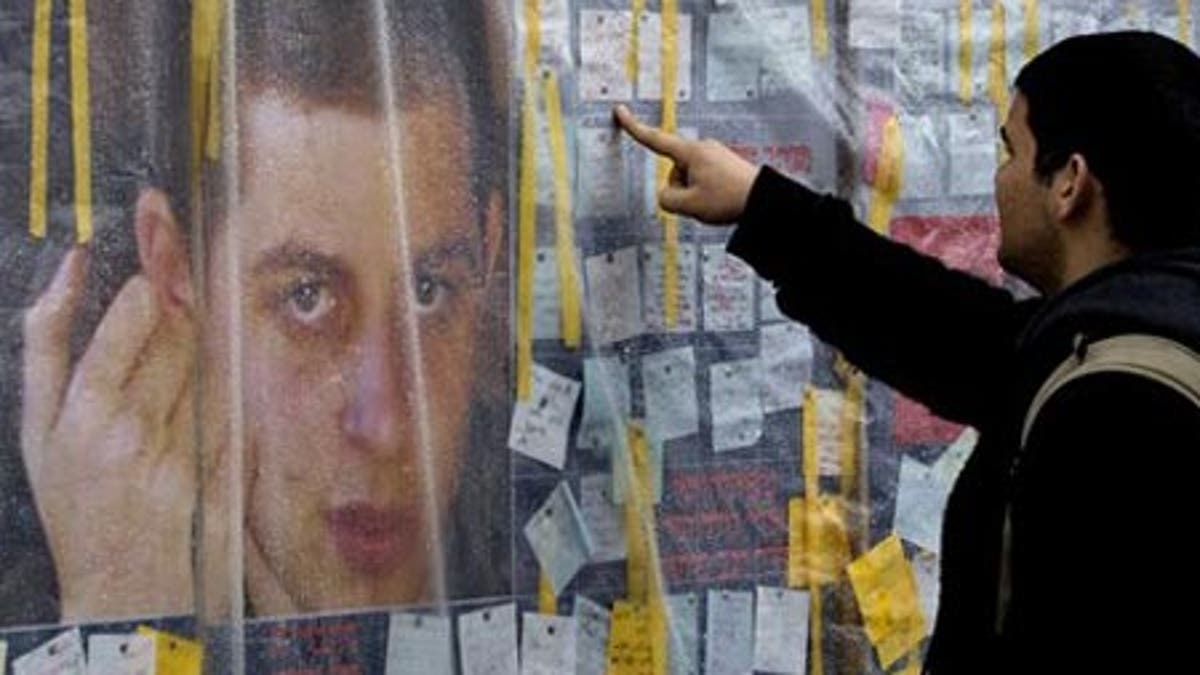
March 15: An Israeli youth reads notes for Sgt. Gilad Schalit, who was captured by Hamas-allied militants in Gaza in 2006, on boards near a protest. (AP)
JERUSALEM – Israeli Prime Minister Ehud Olmert said Tuesday that Israel will not accept Hamas demands for releasing prisoners in exchange for a soldier held nearly three years in Gaza.
Olmert addressed his nation on TV after his Cabinet heard a report about failed indirect talks in Cairo between Israel and Hamas about a prisoner exchange. Olmert said Israel would not agree to add names to the list of prisoners it was prepared to release to win freedom for the soldier, Sgt. Gilad Schalit, 22.
"Israel presented generous far reaching proposals to the other side that were supposed to bring about the release of Gilad," Olmert said. "I approved these proposals that meant in practice that hundreds of terrorists would be released, including some who killed Israelis. These proposals were rejected. Others will not be handed over to the Hamas."
Olmert said efforts would continue, but it was clear that he believed there was no chance for a deal while he is in office.
"There are red lines," he declared. "We will not cross them."
As ministers discussed the faltering deal, Schalit's parents and brother sat outside Olmert's office, wearing T-shirts with the soldier's picture that said "help."
After a briefing from Olmert, the soldier's father, Noam Schalit, held out no hope that the Olmert government would win freedom for his son, saying only that it would be "a basis for the next government to continue the efforts."
Israel TV broadcast the live statement on a split screen with Olmert on one side and the soldier's parents watching on the other from their protest tent outside Olmert's residence.
Throughout the day, prospects further deteriorated, with Israel and Hamas accusing each other of undermining the negotiations.
Even so, Hamas leaders voiced hope for a last-minute breakthrough.
"The door is not closed. We believe the occupation is going to retreat," Osama al-Muzeini, a Hamas leader in Gaza, told the group's radio station Tuesday afternoon.
The Islamic militant group is seeking the release of hundreds of Palestinian prisoners in exchange for Schalit, including dozens convicted in deadly attacks on Israelis.
Israel is holding an estimated 8,000 Palestinian prisoners in its jails, and Hamas wants some 1,200 freed, including 450 who masterminded or were otherwise involved in suicide bombings and other deadly assaults.
Israel balked at approving the entire list and wanted to deport some of the more notorious prisoners, fearing they would resume their militant activity if they returned home, Israeli officials said.
The Israeli official, speaking on condition of anonymity because of the sensitivity of the issue, said Israel agreed to free 320 of the 450 prisoners. He said a deal could still be struck if Hamas presented a new list of 450. That would be most unlikely after a year of contacts, with Hamas saying it would not compromise.
"The Zionist occupation is trying to maneuver on the number of the prisoners, trying to exclude some of the names we listed, or to deport dozens of them, and this is rejected by Hamas," Hamas official Salah Bardawil said.
Hamas officials say the list includes the Palestinians' highest-profile prisoner, Marwan Barghouti, considered a likely successor to Palestinian Authority President Mahmoud Abbas. Barghouti has spent the past seven years in an Israeli prison for his role in attacks that killed four Israelis and a Greek monk.
A continued impasse over Schalit could have far-reaching consequences for war-battered Gaza, especially regarding Israel's ongoing blockade.
As long as the blockade is in place, Gaza cannot import the construction materials and equipment it desperately needs to rebuild after a fierce Israeli offensive early this year.
